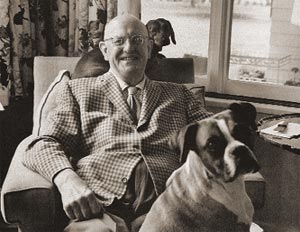Duke of Wooster-shire
Donald Morrison
To millions of readers in scores of languages around the world, the
name P.G. Wodehouse evokes a mirthful Edwardian realm of hapless
dukes, fearsome maiden aunts and one very tolerant, quietly competent
valet. Wodehouse, who died in 1975 at the age of 93, remains one of
the best-loved English writers. Nearly all of his 100-odd novels and
story collections are still in print. Wodehouse magazines and fan
clubs dot the globe. Hardly a decade passes without a new movie or
play inspired by his creations: the dim but affable Bertie Wooster,
his long-suffering gentleman's gentleman Jeeves and their screwball
cohorts at Blandings Castle and the Drones Club.
 GENIUS IN EXILE Wodehouse, circa 1960, relaxes with friends in his Long Island home
GENIUS IN EXILE Wodehouse, circa 1960, relaxes with friends in his Long Island home
So rich is Wodehouse's legacy that it is difficult to understand why
he almost destroyed it. As Robert McCrum recounts in his exhaustive,
elegantly written Wodehouse: A Life (Viking; 530 pages), the author
was at the peak of his popularity when, in 1941, he made a series of
wartime broadcasts for the Nazis while interned in Germany. He was not
coerced, but he clearly misjudged the seriousness of his action. In
Britain, politicians denounced him in Parliament and columnists in
print. Libraries withdrew his books. The British government
investigated him for treason, and editors wouldn't touch his writings
with a cricket bat. The man whose vision of Britain is now engraved in
the popular mind could not go home again. Concludes McCrum, literary
editor of Britain's The Observer: "The Second World War finished
Wodehouse."
Not quite. He found a new home and, eventually, even greater fame
after the war. As McCrum also notes, Wodehouse was every inch the
Edwardian: calm in a crisis, aloof but generous (he supported an old
school chum for years), quietly productive (he could pound out a
novel's first draft in days), and fit as an oak (thanks to daily
calisthenics). Many of those qualities can be traced to Wodehouse's
Woosterish upbringing. A descendant of Norfolk nobility, including a
sister of Henry VIII's ill-fated wife Ann Boleyn, Pelham Grenville
Wodehouse rarely saw his parents ║ a colonial administrator and his
dour wife. The young "Plum," as Pelham was nicknamed, was raised by
nannies and schoolmasters to become an athletic but bookishly solitary
child, reading the Iliad at age 6 and penning his first story at 7.
When his parents refused to fund him at Oxford, he joined a London
bank, writing at night and resigning as soon as he could support
himself as a freelancer.
Wodehouse's heart was in musical comedy. He was writing lyrics for
London's West End in his 20s, and by 1917, five shows featuring his
lyrics were playing simultaneously on Broadway. Commuting to the U.S.,
Wodehouse collaborated with Jerome Kern, George and Ira Gershwin and
Cole Porter. "Musical comedy was my dish," Wodehouse wrote of those
happy days. "I would rather have written Oklahoma! than Hamlet.'"
But the real money was in Wooster-shire. After a stream of popular
stories about well-born wastrels, among them Bertie Wooster, Wodehouse
introduced a valet named Jeeves. He paired the two to solve plot
problems in The Man With Two Left Feet (1917), and the rest is
history. To the many theories about the characters' origins, McCrum
insightfully adds: "The cunning servant■foolish master has been a
staple of comedy since classical times, and Wodehouse certainly knew
his Plautus and his Terence." By the 1920s, magazines like Liberty and
The Saturday Evening Post would pay up to $35,000 to serialize a
Wodehouse novel. At the dawn of the Depression, he had a Mayfair
mansion and a Rolls Royce with his crest on the door.
Money led to his downfall. Tax authorities in the U.S. and Britain
began to pursue those royalties, so Wodehouse fled to the northern
French resort of Le Touquet. There in May 1940 he was seized by the
German army. For 13 months he was held in a succession of camps, where
fellow inmates report that he helped keep morale high and shared his
worldly goods with them. Shortly before being freed, he agreed to give
five radio talks for his fans in the U.S., which had not yet entered
the war (an event the Germans hoped his reassuring words could
forestall). Not realizing how desperate Britain's plight had become
since his capture, he produced a breezy account of camp life. "There
is a good deal to be said for internment," he observed in the first
broadcast. "It keeps you out of the saloons and gives you time to
catch up with your reading."
He spent the rest of his life regretting that lapse. Even before the
war ended, British officials dropped plans to prosecute Wodehouse, but
the decision was not made public until after his death. He exiled
himself to the U.S., where he was viewed with suspicion, and his
stories of dukes and butlers were deemed out of touch. "I sometimes
wish I wrote that powerful stuff the reviewers like so much, all about
incest and homosexualism," he half-joked. Wodehouse lived in
near-seclusion in Long Island, New York, with his wife Ethel (their
daughter Leonora died in 1944) as he ground out yet more tales of his
fantasy world. Increasingly, as modern life coarsened and Cold War
anxieties deepened, people decided they liked his world better than
theirs.
His countrymen eventually forgave his wartime indiscretions. He was
granted a knighthood six weeks before he died. Today the Oxford
English Dictionary contains 1,600 Wodehouse citations, and scholars
dissect his writings for a depth that isn't really there. What is
there, as fans can attest, is a timeless, effervescent cocktail of
comic juxtapositions, smoothly musical prose and exuberant generosity.
"Behind the Drones and the manor house weekends," writes McCrum, "is a
sweet, melancholy nostalgia for an England of innocent laughter and
song." An England that Wodehouse, after his thoughtless blunder, never
saw again.
|
